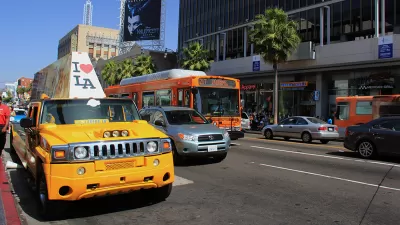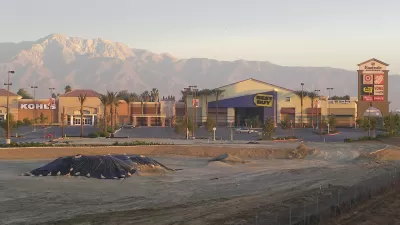According to new figures from California's Annual Planning Survey, the state's environmental law is low on the list of barriers to infill development, writes Ethan Elkind.
California's landmark Environmental Quality Act (CEQA) has been under threat of late from a broad coalition of politicians, labor leaders, and developers, who see the law as an easily abused obstacle to economic development. However, as Elkind points out, according to the results of the Governor's Office of Planning and Research's 2012 annual survey [PDF] of California's local governments, those looking to blame CEQA for preventing infill development should look elsewhere.
"Of the 423 cities (88% of all cities) and 49 counties (84% of all
counties) responding to the survey, less than 5% cited CEQA as the
primary barrier to infill development. Instead, the big 'winners' were
infrastructure constraints, lot issues, lack of funding, community
opposition, and the economy, among others. CEQA was way down on the list."
"So why do infill developers make such a big deal about CEQA?" asks Elkind. "My [Elkind's] theory
is that individual developers will be focused solely on their own
projects, and if CEQA is a threat to their investment and risk-taking,
they will understandably become CEQA haters. But perhaps this
project-based focus distorts the view of the larger forces that stifle
infill business opportunities throughout the state, such as in the
suburb with the major rail line that won't zone for more downtown
development or the rundown neighborhood near jobs and services that
needs new infrastructure."
"Ending CEQA tomorrow won't magically lift
these barriers and create new infill opportunities, and it won't
convince local communities to support new downtown development."
FULL STORY: Why Developers Shouldn’t Blame Environmental Review for the Lack of Infill

Planetizen Federal Action Tracker
A weekly monitor of how Trump’s orders and actions are impacting planners and planning in America.

Congressman Proposes Bill to Rename DC Metro “Trump Train”
The Make Autorail Great Again Act would withhold federal funding to the system until the Washington Metropolitan Area Transit Authority (WMATA), rebrands as the Washington Metropolitan Authority for Greater Access (WMAGA).

The Simple Legislative Tool Transforming Vacant Downtowns
In California, Michigan and Georgia, an easy win is bringing dollars — and delight — back to city centers.

The States Losing Rural Delivery Rooms at an Alarming Pace
In some states, as few as 9% of rural hospitals still deliver babies. As a result, rising pre-term births, no adequate pre-term care and harrowing close calls are a growing reality.

The Small South Asian Republic Going all in on EVs
Thanks to one simple policy change less than five years ago, 65% of new cars in this Himalayan country are now electric.

DC Backpedals on Bike Lane Protection, Swaps Barriers for Paint
Citing aesthetic concerns, the city is removing the concrete barriers and flexposts that once separated Arizona Avenue cyclists from motor vehicles.
Urban Design for Planners 1: Software Tools
This six-course series explores essential urban design concepts using open source software and equips planners with the tools they need to participate fully in the urban design process.
Planning for Universal Design
Learn the tools for implementing Universal Design in planning regulations.
Smith Gee Studio
City of Charlotte
City of Camden Redevelopment Agency
City of Astoria
Transportation Research & Education Center (TREC) at Portland State University
US High Speed Rail Association
City of Camden Redevelopment Agency
Municipality of Princeton (NJ)





























